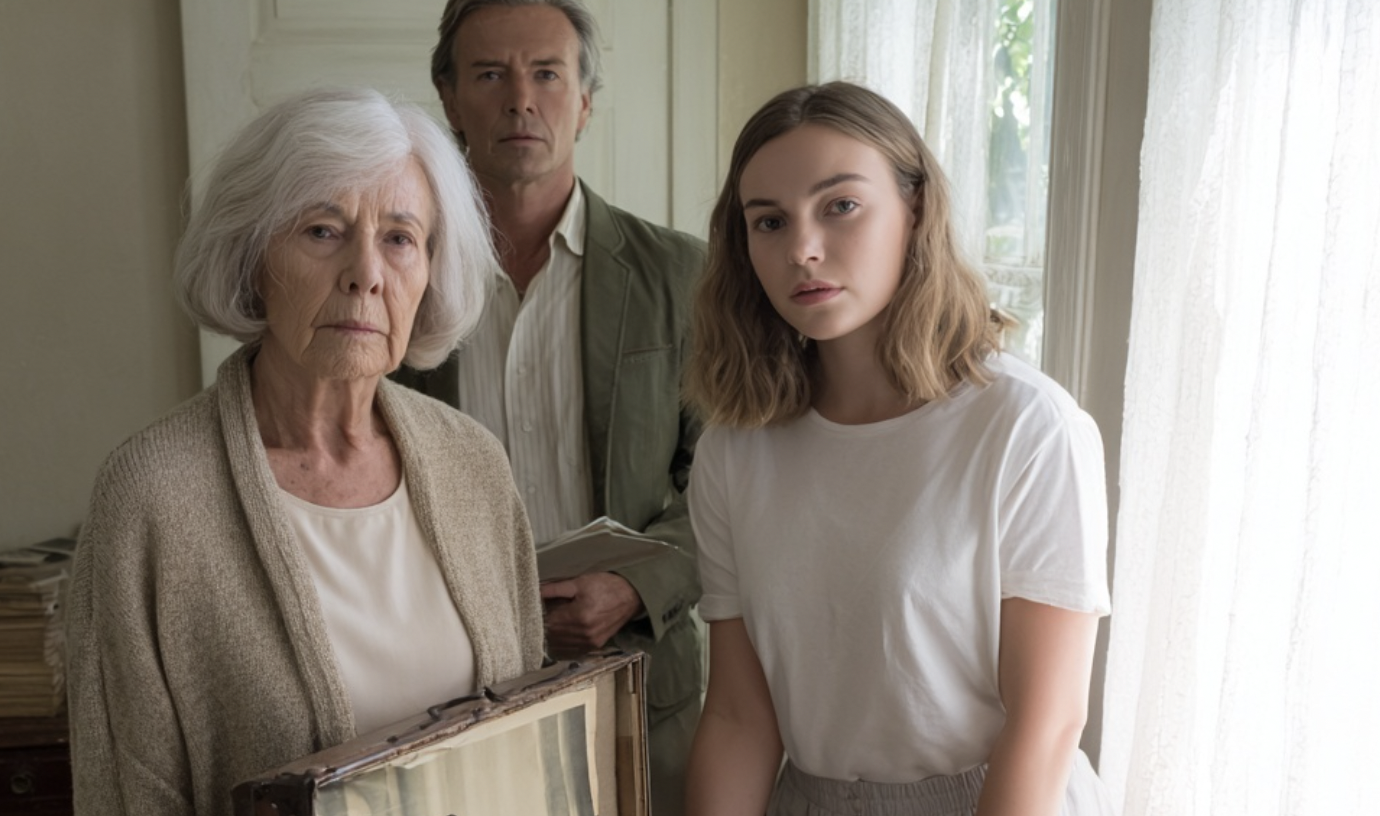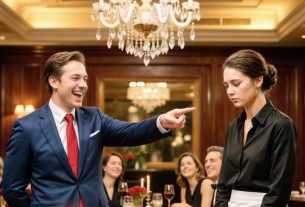At Galina’s place there was always a scent of lavender—not because she particularly loved the fragrance, but because that’s what her beauty salon smelled like. Everything—from the cuticle gel to the towel softener—carried that pharmacy-clean softness and a sense of feminine well-being. She smelled of stability. Of success. And of a light, almost imperceptible sadness.
The salon, by the way, was hers. Not “ours,” not “we leased it,” not “an uncle helped”—hers. On the ground floor of an old Stalin-era building, with a sign that read “La Femme” and neon lips on the window. Women went there not only to cut or color their hair, but simply to exhale. People kept telling Galina:
— “It feels like a different life in here.”
And at home she did have a different life. A very different one. Konstantin, her husband, worked as a sales manager for something—construction materials, maybe office furniture. He often mixed it up himself. And his salary was like a postman’s in the ’90s: “it all goes on transportation.” That was a quote. An apology. Practically a mantra.
— “Gal, you know we’ve got that HOA fee for the ‘Harmony’ complex again—six thousand, and I need to buy some boards. Mom’s back is acting up—her sciatica again…”
— “Of course,” she’d smile. “I’ll transfer it now.”
And she would transfer it. Because why? Because “family means support.” And she, for the record, had lost her parents early. Her father left when she was in ninth grade, her mother—during her second year at university. So she was desperate for these new people to become her own. Anyone at all.
Her mother-in-law, Maria Ivanovna, accepted the transfers like utility payments: in silence. Now and then she’d nod, like a village elder. Once every six months she’d say:
— “Well, you’re no slouch, Galочка… Clearly you’ve got a head on your shoulders. Good girl.”
Which was nice, sort of—but something still itched.
That Thursday Galina was riding home in a taxi—tired to the point of transparency, the way you feel after a shift in intensive care, though she’d merely given a client a pedicure with elements of psychotherapy. The client had sobbed about how her husband had started an affair with a masseuse and then blamed his wife for “growing cold.” After a session like that they pay you, sure, but it’s like your soul has been shaken out.
When she walked into the apartment, Konstantin was already at the table. The table was from IKEA, but it looked like it belonged in a prosecutor’s office—square, severe, and the site of constant interrogations.
— “Gal, so… could you toss mom another five thousand? Her blood pressure’s up and the pills are expensive.”
— “And where’s your salary?” she asked without anger, but with interest.
— “I lent it to Svetka and Anka—they took the kids to the sea, didn’t have a penny.”
Svetka and Anka, as Galina called them, were his sister and sister-in-law. And apparently their middle name was “perpetually penniless.” They seemed to even sneeze on credit.
Galina sat down.
— “I’ve been thinking… Maybe that’s enough?”
— “Enough what?” Konstantin was surprised.
— “Enough of supporting everyone. Maybe someone else in this family could start earning money besides me?”
He sighed like a tractor.
— “Gal… why are you like this? It’s Mom. And my sister—our own blood, they don’t even have a proper renovation, the kids are growing up… You’re not stingy, are you?”
— “Not stingy. Apparently just a fool.”
He said nothing. And she went to boil buckwheat. A rich life doesn’t mean eating lobsters. It means you can eat buckwheat because you want to, not because there’s nothing else.
Two days later they went to Maria Ivanovna’s—it was her birthday. The house was small, old, but pretentious. Tapestries on the walls, and under the rug—another rug. On the table—aspic, “herring under a fur coat,” and of course her legendary “flourless cake,” which for some reason was always eaten with spoons like porridge.
Galina was about to head to the kitchen to help when she heard a familiar laugh behind the door. A woman’s. And voices.
— “Well, Galka transferred again, as usual.” That was Sveta.
— “She can’t do without us—without a family. Where else would she go.” That was Anka.
— “What do you expect, she’s basically an orphanage kid at heart…” Maria Ivanovna tittered.
Orphanage kid.
The word soaked in like a drop of dye into silk. Small, nasty, cold. Sweetened with giggles, like a poisoned candy.
Galina didn’t go into the kitchen. She walked out of the apartment in silence, leaving the door open. She just left. There was nowhere to go—but there was no place to stay either. The “home,” it turned out, wasn’t a home. It was a bunker. And she was a hired gun in it.
Late that night, already lying in the bath, she opened her banking app and, for the first time in seven years, didn’t transfer a single ruble to anyone. Then she sat up and wrote a simple message:
“Kostya. I’m tired. Let them support you now. I’m out of this game.”
And she turned off her phone.
Konstantin showed up at the salon without warning. No call. No flowers. Dirty sneakers. The face of a man who hadn’t slept, hadn’t eaten, and, judging by his eyes, hadn’t fully understood why his life had suddenly fallen apart.
— “Can we talk?” he asked quietly, almost timidly.
Galina looked at him through the mirror. The client—Irina Lvovna, an accountant with a signature coiffure and the character of an honorary union member—tensed at once.
— “In the back. Five minutes,” Galina tossed, taking off her apron.
The back room was sacred ground. An old robe hung there, there was a kettle, and also a chair that, according to all the staff, was the best place to cry. Even Lida cried in it—the nail tech who swore she “never cries at all.” The cognac was kept there too. Just in case. This was exactly that case.
— “What’s wrong with you, Gal?” Kostya started, slamming the door. “You insulted Mom, walked out without a word, cut off the money… Why are you putting on a show, huh?”
— “Putting on a show?” She slowly filled a glass with water. “Kostya, your ears are so dirty you can’t hear how your family talks about me?”
— “It was a joke, for God’s sake!” He threw up his hands. “Women gossip. Everybody gossips. You didn’t take it seriously, did you?”
— “So ‘orphanage kid’ is a joke at your place? I was supporting all of you, Kostya. The salon is mine, the apartment is MINE. You rode me like a route taxi. Without paying the fare. With transfers. And now you’re joking.”
— “They’re family! Gal, come on, this is how it is for everyone! You’re just not used to it. In our family that’s how it works. Everyone helps everyone.”
— “Helping goes both ways. When it goes only one way, Kostya, that’s called a downspout.”
He stepped closer, looming. He smelled of cheap deodorant and resentment.
— “So what do you want? A divorce? To grab the apartment? Did you think I’d put up forever with you playing lady of the manor?”
Galina laughed. Loudly, brightly—the laugh of someone who has finally woken up.
— “First, the apartment is mine. I bought it before you. It’s in my name. I have my mother’s will. Remember? I can hang you a framed copy. Second, I won’t ‘grab’ anything—I’ll THROW YOU OUT. And third… you put up with me? You? I put up with you, Kostya. With you telling my friends about your high blood pressure from ‘her sterility.’ With your mother wolfing down my gifts while rolling her eyes. With your sister constantly ‘temporarily’ camping at our place with her kids and leaving with bags full from our fridge. I put up with it. Because I wanted to be part of your… what is it… fly-by-night family firm.”
He couldn’t take it.
— “To hell with you,” he muttered and walked out, slamming the door.
He started carting away dishes that very evening. As for his favorite mug that said “Best Husband,” he dropped it by the door. It cracked—like the symbol of the year. Maybe the symbol of their whole life.
Two days later Maria Ivanovna arrived.
— “Galочка, what have you done?” she scolded. “Kostya isn’t eating or sleeping. His blood pressure… As a woman you should understand. You two are just having a crisis. You’ll get through it.”
Galina looked at her mother-in-law, and inside her head there was an astonishing calm. As if someone had finally shut the draft.
— “I’ve understood one thing, Maria Ivanovna,” she said carefully, syllable by syllable so she wouldn’t misspeak. “When I paid for your medicine, that wasn’t a problem. When I paid for your daughters’ vacations, you said, ‘Galya is so kind.’ But the moment I said ‘no,’ I became a stranger to you.”
— “That’s not it… You’re imagining things! You and Kostya are just different. He’s warm-hearted, simple, and you…”
— “And I am independent. Inconvenient. I hear too well when people say nasty things about me. I think too much, apparently. Only you know what? I’ve decided to think only about myself now. And spend my money on people who respect me.”
— “You ruined his life, Galочка,” the old woman breathed theatrically.
— “No, Maria Ivanovna. I canceled his free spa membership to a place called ‘Comfort & Cash.’”
After that visit the apartment grew astonishingly quiet. No calls. No texts. Even Anna and Sveta seemed to have found a fresher sponsor. Or started collecting child support.
Two weeks later a lawyer came for Konstantin. With papers. He wanted a share. In response, Galina produced copies of the will, the purchase contract, the certificate of inheritance, and said:
— “When you leave—leave. And take your debts with you.”
Then she sat alone for a long time. Listening to the hum of the refrigerator. Drinking wine. Staring at the wall. Wondering: does that make me lonely now? Or the opposite?
And then the phone rang. On the screen—“Lena. Dacha neighbor.”
— “Hi, Galочка. Your plot is overgrown. Want to go out there this weekend? I’m scared to go alone—what if there are moles or drunks. At least you’ll get some fresh air.”
Galina smiled. Moles are fine. Better than grown men living at her expense.
— “Let’s go. I might even repaint the cottage. In the color of freedom.”
On Friday evening Galina stood on the balcony with a mug of tea. Not wine—tea. She wanted something simple: hot, tart, with lemon. Outside, a petty, irritating drizzle was falling—the kind an umbrella can’t really save you from, but there’s nowhere to run either. That’s exactly how she’d felt the past few years—soaked and unwanted, under someone else’s weather.
The phone stayed quiet from the day she sent the lawyer packing. No messages. No reproaches. No “let’s talk.” Only a push notification from the bank: “Transaction: transfer from K. Lebedev. Amount: 2,500 rubles. Note: ‘Debt for the watermelon, 2021.’”
Well, at least he returned the watermelon… A man of principle, she smirked.
That evening she finally allowed herself to do what had been itching for ages: she climbed into the closet where Konstantin’s suits hung. She took everything out. Carefully. Without malice. Just—took it out. The way you pull nails from a wall after a move. Then she opened the dresser—socks, underwear, belts, even that old torn robe that said “Tsar.” Everything went into bags. Six bags. One—just shoes. And one—grievances. That one held the old phone where she’d found the chat: “she’d do me a blow-dry too if I paid her.” With a smiley. From some friend. And Kostya had replied: “yeah, she’s got occupational hazard.” They laughed.
She set the bags by the door. Then by the elevator. Then out on the street. And then… she went back up and hurled one right off the balcony. Honestly, she didn’t know which one. She just grabbed and flung. It was heavy. Probably the one with the boots. It hit with a dull thud. Someone down below shouted:
— “Hey! Are you out of your mind?!”
She closed the window. Let them think what they want. The important thing was that she now knew who she was.
Saturday morning Maria Ivanovna arrived. No call. In a headscarf, as if heading to church.
Galina opened the door, not the least surprised.
— “I came to talk, Galочка… Woman to woman. You and me.”
— “One—former daughter-in-law, the other—former mother-in-law,” Galina clarified, leaning against the jamb. “Speak.”
— “Kostya’s at his sister’s for now. He’s unwell. His heart. His blood pressure. He doesn’t sleep at night, he misses you. He’s sorry. He’s just stubborn. A man, you understand?”
— “I understand. Stubborn. Money—‘mine,’ responsibility—‘no one’s.’”
Maria Ivanovna swallowed.
— “Maybe you could let him come back for a while. Home. He is still your husband.”
— “Home?” Galina repeated. “Maria Ivanovna, this is MY home. The apartment is in my name. He’s taken everything he could already. Even the old razor he never used. The only thing he never brought was respect.”
— “You’re… you’re an egoist, Galочка!” the old woman suddenly raised her voice. “You always wanted a family! Well, you had a family. And now what—better to sit alone? What kind of woman are you if you can’t forgive?”
Galina looked straight at her. Without blinking.
— “And what kind of mother are you if you raised a man who treated his wife like an ATM? Without a PIN code—with love, with affection. With a PIN code—without anything. Only demands.”
— “You’re the ATM!” the mother-in-law shrieked. “With counterfeit bills and an icy soul!”
Galina closed the door. Wordlessly. Quietly. Almost respectfully. Because this was the last door she would slam not in someone’s face—but on the past.
A week later she went to the dacha. An old house, shabby, with a lopsided porch. But hers. The plot was overgrown—yes. But the daisies were blooming. The ground smelled of earth. Real earth. Not the sort people water with manure out of a sense of duty.
Her neighbor Lena met her on the path:
— “Well? Won the war?”
Galina smirked:
— “Not won. Stood my ground.”
Then they drank tea. On the porch. With no scenes. No reproaches. No “can you transfer to my card.”
And for the first time in many years—it was quiet.
And silence, it turned out, can be happiness.
Especially when it’s your own.


